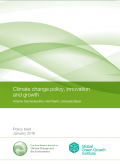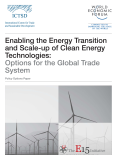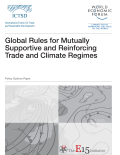Countries, including members of the G20, should strengthen the credibility of their pledges to limit or reduce annual emissions of greenhouse gases in order to build confidence in the Paris Agreement on climate change.
The report identifies the key determinants for policy credibility against which each country’s INDC pledges could be assessed. These are applied to the INDCs that were submitted by G20 members ahead of the Paris summit. No G20 country is found to have ‘no credible basis’ for their INDC across the determinants explored in this analysis. However, there are significant differences in the level of and balance among the determinants of credibility for the individual countries. Notably, three broad groups of countries can be identified: 1) Countries with most of the determinants at a level ‘largely supportive’ to credibility; 2) Countries with most of the determinants at least ‘moderately supportive’ to credibility, but displaying significant weakness in one of the determinants; 3) Countries that have scope to significantly increase their credibility across most determinants.

Actions to stimulate low-carbon innovation – a global policy priority – are moving full speed ahead. Twenty countries from across the developed and developing world, including the UK, the US, China, India, the United Arab Emirates and Australia, recently signed up to ‘Mission Innovation’ at the 2015 United Nations Climate Change Conference in Paris, promising to double their public investment in low-carbon energy innovation and to promote increased international cooperation. Alongside this, a global group of 28 key investment players from 10 countries, including Bill Gates, Mark Zuckerberg and Richard Branson, are mobilising to deliver ‘truly transformative energy solutions for the future’ as part of the new ‘Energy Breakthrough Coalition’. In addition, the European Commission is developing a strategy to support low-carbon innovation, to be published with the second State of the Energy Union report in late 2016. This policy brief provides evidence to inform these and other initiatives seeking to stimulate low-carbon innovation.

The present paper seeks to examine the ways in which current trade policies and frameworks enable or hold back the pressing need for further development of clean energy. Based on this analysis, it identifies a set of policy options for the global trade system to support the scale-up of CETs. A first set of options is related to addressing systemic issues with a view to enhancing trade governance for renewable energy and climate policies in the context of the WTO framework. These proposals include: 1- an amendment of GATT rules; 2- temporary waivers; 3- an interpretive understanding to clarify existing obligations; 4- a plurilateral agreement; 5- a moratorium on dispute settlement in the area of clean energy.

As the world intensifies its search for global solutions for climate change, far too little attention has been paid in global policy-making to the nexus between climate change and international trade. In particular, important opportunities for the trade system to contribute to addressing climate change have been overlooked. The overriding message addressed to both trade negotiators and climate negotiators in the present paper is that they must begin by acknowledging the inseparability of the two issues with the aim of framing global rules on trade and on climate that are mutually consistent, supportive, and reinforcing.
The green growth transition will be large, system-wide and structural. In other words, a new industrial revolution. This will require new green growth policies that foster economic growth and development while ensuring that natural assets continue to provide the resources and environmental services on which our well-being relies (OECD, 2011). More and better evidence is needed to support the design of effective green growth policies and to understand their impact on the economy. This policy brief summarises the main policy implications of a two-year research programme, sponsored by the Global Green Growth Institute (GGGI), which aimed to contribute to the growing evidence base.
